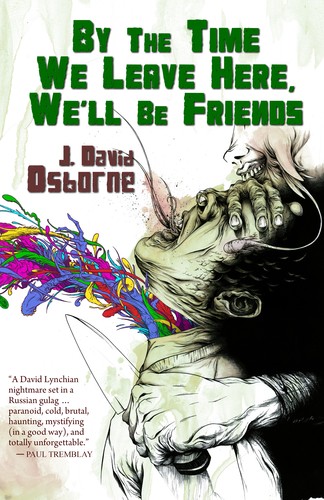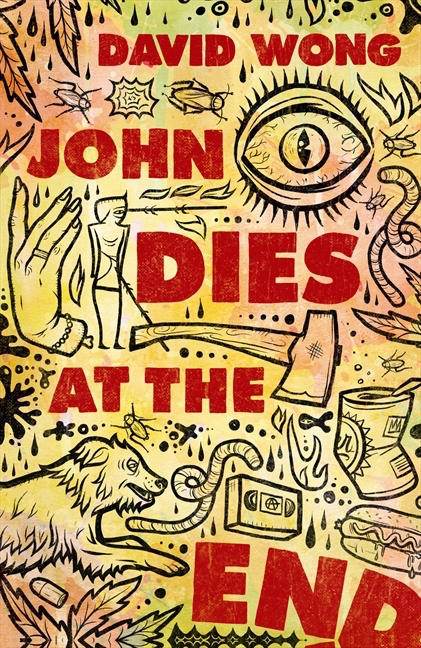This whole story is a metaphor for something. A barn-sized metaphor that I couldn’t hit the broad side of with a really big rock. I say really big rock because this book is like a really big rock and reading it was like pushing said really big rock from one place to another. Not a long distance but a difficult one.
Sometimes poetic. Sometimes frantic. Often self-indulgent. This story is jagged and blunt in all the right places that make it hard to hold onto. Mostly, though, it was monotonous. Considering the backdrop of the story is a Russian gulag filled with dirtbags passing time by smoking opium and hurting each other, then sucking prison tea and hurting each other, then smoking opium and hurting each other, monotony does a great job conveying living hell.
He stared at the hole in front of him, deep enough now that he couldn’t see the dog inside of it, only the metronome of flung tundra.– The only time I smiled
The book’s dust jacket says this is a tail of ESCAPE (from gulag) but, twist, it’s about METAPHOR. ESCAPE isn’t even mentioned before you’re eighty percent of the way through, all the while jumping willy nilly between daily tasks, psychadelic feaver dreams, and light conversation which all mostly seem to just add folds to METAPHOR. Folds usually come in the form “scenes” free of exposition and loaded with chopped up sentences. Imagine pouring out a box of lucky charms. Imagine the marshmallows are words and the useless cereal part, periods. Now read it.
I’m realizing I haven’t mentioned the characters yet. There are characters.
By the end, I felt a little more stupid. Not because I pushed a rock, but because I allowed a rock to taunt me the whole time with a metaphor that I could only maybe glimpse if I pushed it a few more times. I didn’t really enjoy it, though, so that probably won’t happen. I want to say it was bad but I think that’s mostly because I didn’t get it and am frustrated by my own lack of skill in reading comprehension. It managed to churn my guts a few times, which I’ll always give points for.
In all sincerity, this seems like a very personal story that I can’t see anyone writing without having suffered, which I appreciate. I’d like to read more by the author in the hopes that they’ve become more liberal in their descriptions.
There’s this guy I knew in high school. He was good for a laugh but usually at the expense of someone’s balls. I didn’t notice when he hadn’t been around for a while till someone asked about him. It didn’t take long till there was a story going around that he wandered off drunk, got clipped by a train and stumbled into the ocean, never to be seen again. I looked him up on Facebook - he’s fine.
John and David are like the idiot mentioned above: less for the crotch games and more for the urban legend-y quality. These are the guys I’d play movie theater hotdog baseball with when we should have been wiping the concession counters for the millionth time. They weren’t popular but were well known for the dumb shit they did. What else do you do when you work crap jobs, in a turd town, with a shit education? Start a cult? The main difference here is that whatever tall tales pop up about them are way less weird than what’s really going on.
Dark matter makes up 99.99 percent of the universe, and they don’t know what it is. Well I do. It’s apathy.– David Wong
The idea of “early twenty-somethings fighting demons and saving the world” isn’t new but also isn’t usually this good; which absolutely comes from the quality of the characters. John’s roundabout brand of genuine love and concern tossed with David’s disdain for both normal and abnormal life, add up to something compelling enough without alternate plains of existence. I would have kept reading if it was just about them trying to pay bills and out-wiener joke each other.
Luckily, there’s a lot more than that. Like spooky shadow boys, a helpful dog, butt jokes, cops, a doctor(?), the soy sauce squad, Amy, gore, and insane burrowing mind control mosquitos.
Son, the greatest trick the Devil pulled was convincing the world there was only one of him.– Dr. Marconi
One of David Wong’s (the author is the main character) greatest strengths is to play with perspective and perception. It’s the butter slathered on the bread that is the dirt city of [Undisclosed]. The series of stories in this book are told by David to a skeptical reporter. It’s a little bit clunky and cliche (purposefully?) but carries an interesting twist thanks to said skills. When the third member of the team, Amy, shows up, it really shows off how easy it is to misperceive not just the creeps in the shadows, but the weirdo in your “special needs” class too. Toward the end, things become more abstract and David Wong loosen’s his grip a bit but the results bring some deep humility and complexity to David, John and Amy.
Since reading, I’ve been considering my own mortality a lot. We are all very frail and dumb.

